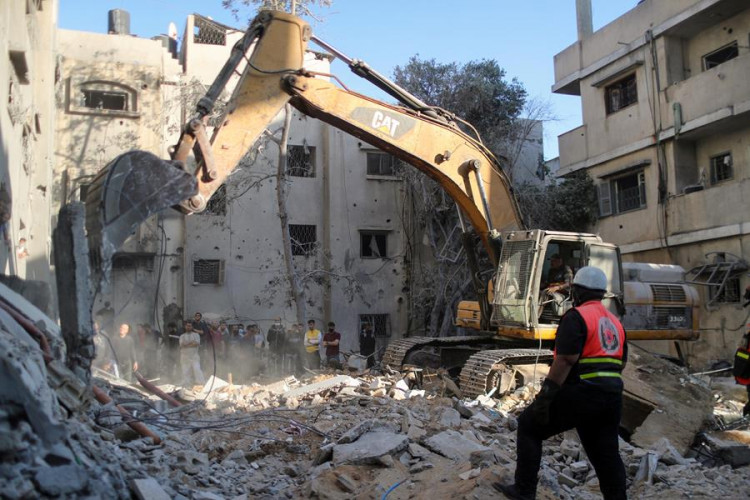In the wake of Israel's incursion into Gaza's largest hospital, the United Nations Security Council passed a resolution calling for an urgent humanitarian ceasefire throughout Gaza and the establishment of humanitarian corridors. This resolution, passed since the outbreak of the latest Israel-Palestine conflict on October 7, marks the first successful vote after four previous attempts ended in failure.
Unlike General Assembly resolutions, Security Council resolutions carry legal effects. Although in practice, several parties have chosen to ignore these resolutions, they do add diplomatic pressure.
Recently, leaders from various countries, including Turkish President Recep Tayyip Erdogan, Spanish Prime Minister Pedro Sanchez, and Canadian Prime Minister Justin Trudeau, have escalated their criticism of Israel. Erdogan went as far as labeling Israel a "terrorist state."
Recent polls in the United States indicate a decline in public support for Israel's actions in Gaza. Sources reveal that Qatar is negotiating with Hamas and Israel for a temporary ceasefire and the release of 50 hostages.
The Security Council resolution, drafted by Malta, passed with 12 votes in favor, none against, and three abstentions. The Council, comprising 15 member states including five permanent members, requires at least nine supporting votes for a resolution to pass, with permanent members holding veto power.
In previous votes, Russia's proposals for a complete ceasefire in Gaza did not secure the necessary nine votes. A Brazilian resolution condemning Hamas and calling for a humanitarian ceasefire was unexpectedly vetoed by the United States, which criticized it for not addressing Israel's right to self-defense. Resolutions put forward by the United States emphasizing Israel's self-defense were vetoed by Russia and China.
To avoid the red lines of various countries, the Malta-drafted resolution did not condemn Hamas, emphasize Israel's right to self-defense, or call for a complete ceasefire in Gaza. Instead, it focused on humanitarian aid and the transportation of supplies.
The resolution calls for an "adequate number of days" of humanitarian ceasefire in Gaza and the establishment of humanitarian corridors to allow unimpeded access for UN agencies and their partners.
It also urges Hamas and other parties to immediately and unconditionally release all hostages, especially children, and ensure the prompt delivery of humanitarian aid. The resolution calls for all parties to adhere to international humanitarian law to protect civilians, medical and humanitarian workers, and humanitarian sites, ensuring that the basic needs and relief of Gaza's civilians are not deprived.
No country voted against the resolution, with the United States, the United Kingdom, and Russia abstaining. The U.S. and the U.K. were dissatisfied with the resolution's failure to condemn Hamas and mention Israel's right to self-defense, while Russia was displeased with the lack of a call for a complete ceasefire.
Before the vote, Russia proposed an amendment calling for an "immediate, lasting, and sustainable humanitarian ceasefire and the cessation of all hostilities." The amendment received only five votes in favor, with the United States opposing and the rest abstaining.
Vanessa Frazier, Malta's Permanent Representative to the United Nations, described the passing of the resolution as "an important first step." China's Permanent Representative to the United Nations, Zhang Jun, emphasized that the effectiveness of a Security Council resolution lies in its implementation. He suggested that the Council should seriously consider establishing necessary mechanisms to monitor and report on the implementation of this resolution.
Due to the legal effect of Security Council resolutions, UN Secretary-General António Guterres will report on the implementation of the resolution at the next Middle East meeting of the Security Council on November 28.
Previous Security Council resolutions calling for ceasefires in conflicts like Syria have not had practical effects. Gilad Erdan, Israel's representative to the United Nations, has already opposed the Council's resolution, calling it disconnected from reality and "meaningless."
Erdan stated that regardless of the Security Council's decision, Israel will continue to act in accordance with international law, while Hamas is unlikely to even read the resolution, let alone comply with it. He accused Hamas of deliberately worsening the humanitarian crisis in Gaza to prompt the United Nations and Security Council to halt Israel's actions.
"This will not happen," Erdan emphasized. "Israel will continue its operations until Hamas is destroyed and the hostages are freed."
Richard Gowan, the United Nations Director for the International Crisis Group, believes that while the Security Council's resolution may not put significant pressure on Israel, the United States might urge Israel to make concessions on humanitarian aid issues to align with the international community's calls.
Sources speaking to Reuters revealed that Qatar is mediating a three-day ceasefire between Hamas and Israel, during which Hamas would release 50 hostages. In exchange, Israel would release Palestinian women and children prisoners and allow more humanitarian supplies into Gaza.
If realized, this would be the largest hostage release operation since the conflict began. Israel estimates that Hamas has kidnapped 240 hostages, including Israeli soldiers, civilians, and foreign nationals.
Hamas has reportedly agreed to the broad terms of the plan, but Israel has yet to relent. Benny Gantz, a member of Israel's wartime cabinet and former defense minister, stated on Wednesday that even if Israel is asked to temporarily cease fire to retrieve hostages, the fight against Hamas will not stop until Israel's objectives are met.
Leaders from various countries have intensified their criticism of Israel. On Wednesday, Erdogan issued his strongest condemnation of Israel to date, directly labeling it a "terrorist state."
Erdogan condemned Israel's attack on Gaza as "the most treacherous in human history," supported "unconditionally" by Western countries. He called for Israeli leaders to be tried for war crimes at the International Court of Justice in The Hague, accusing Israel of implementing "state terrorism" by driving out Gaza's civilians and bombing the area. Erdogan also reiterated Turkey's stance on Hamas, considering it a political party that has won elections, not a terrorist organization.
Hamas, a branch of the Egyptian Muslim Brotherhood, is not designated as a terrorist organization by Turkey, and some of its senior members reside in Turkey. To date, Turkey has sent 666 tons of humanitarian aid to Gaza, and dozens of Gazan cancer patients have been able to travel to Turkey for treatment via Egypt.
In addition to leaders from the Muslim world, Western leaders have also increased their criticism of Israel.
On Wednesday, Spanish Prime Minister Pedro Sanchez urged Israel to stop the "indiscriminate" killing of Palestinians in Gaza and the West Bank. This marks Sanchez's harshest criticism of Israel to date.
Sanchez reiterated Spain's support for Israel's right to defend itself against Hamas's terrorist attacks and called for the immediate release of all hostages. However, he also demanded that Israel strictly adhere to international humanitarian law, stating that it is "clearly not being followed."
Shortly after Sanchez's remarks, Ione Belarra Urteaga, leader of the Spanish left-wing party and Minister for Social Rights, called for Spain to break diplomatic ties with Israel and impose economic sanctions.
On Tuesday, Canadian Prime Minister Justin Trudeau also called for Israel to exercise maximum restraint, stating that the killing of women, children, and infants in Gaza "must stop." While reaffirming Canada's support for Israel's right to self-defense, he noted that it should not come at the cost of "continued suffering of all Palestinian civilians."
As of now, the death toll in Gaza has exceeded 11,000, with 40% being children. On Wednesday, Israel entered Gaza's largest hospital, Shifa Hospital, which housed 2,500 medical staff, patients, and refugees. Israel accused Hamas of establishing a command center in the hospital.
However, the United States, which holds significant influence over Israel, has not called for a ceasefire. On Wednesday, U.S. President Joe Biden stated that Hamas would continue to attack Israel and that expecting a ceasefire to completely stop Hamas's actions is "unrealistic."
The latest polls show a decline in American public support for Israel's actions in Gaza. According to a Reuters/Ipsos poll released on Wednesday, only 32% of respondents believe the U.S. should support Israel in this conflict, down from 41% in the previous survey (October 12-13).
The percentage of respondents who believe the U.S. should play a neutral role in mediating the conflict rose to 39%, up from 27% in the previous survey. A significant 68% of respondents believe Israel should negotiate a ceasefire, with only 31% supporting the U.S. providing weapons to Israel.
Importantly, three-quarters of Democratic voters surveyed support a ceasefire, as do half of Republican voters.






